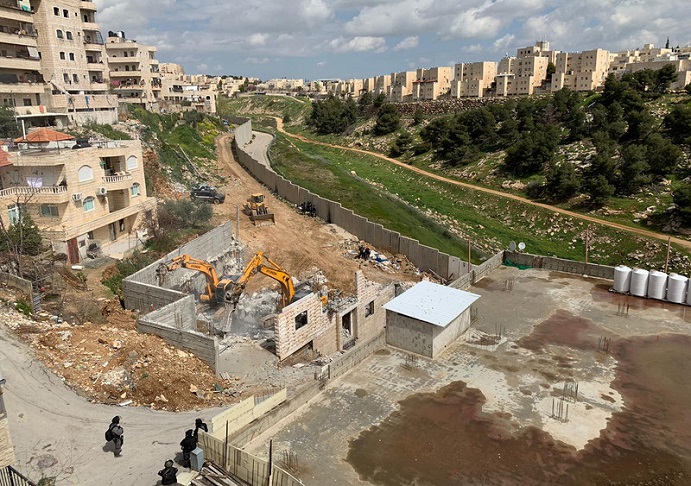
International Crisis Group / Report # 202 (June 12, 2019)
Israel is pursuing new ways of cementing its grip on occupied East Jerusalem, further enmeshing the city’s Palestinians while maintaining a Jewish majority within the municipal boundaries. These schemes could spark conflict. The new Israeli government elected in September should set them aside.
Executive summary
Israel is advancing new policies to entrench its de facto annexation of parts of occupied East Jerusalem. In 1967, Israel occupied East Jerusalem but never fully applied Israeli laws: land registration was partial, most Palestinian schools do not use Israel’s curriculum and East Jerusalemites have residency, not citizenship. In May 2018, with the stated aim of reducing socio-economic inequality, Israel adopted a five-year plan allocating $530 million to East Jerusalem. But the plan’s real goal is to assert Israeli sovereignty, including, most dangerously, by cataloguing all East Jerusalem’s lands in the Israel Land Registry and inducing its schools to use Israeli curricula. In parallel, to protect Jerusalem’s Jewish majority, Israeli leaders are thinking about redrawing the Israeli-demarcated municipal boundaries in order to remove Palestinian-populated areas that lie within these boundaries but to the east of the separation barrier. This “excision” scheme, along with the land registry and curricular initiatives, risks deepening conflict in Jerusalem. Whatever government Israel forms after the 17 September 2019 election should not carry out these plans.
For 50 years, the state has tried to attract more Jews to East Jerusalem and to prod Palestinians to leave. Israel’s national leaders increasingly recognise that this policy has failed to secure a lasting Jewish majority: too few Jews have moved in, and many continue to leave, while too few Palestinians have departed. If current demographic trends persist, Jerusalem could become a minority-Jewish city as early as 2045.
Unable to have all of East Jerusalem without most of its Palestinian inhabitants – and buoyed by support from the Trump administration, international neglect of the Palestinian issue and growing Israeli cooperation with Arab states – Israel is phasing in a plan that would consolidate Israel’s rule over East Jerusalem territory west of the separation barrier. (The separation barrier is a physical divide erected during the 2000-2005 intifada with the security aim of preventing West Bank assailants from entering Israel and the political aim of establishing that in any future solution, Israel would annex many Jewish settlements, including those in and around East Jerusalem, even as a large number of East Jerusalem’s Palestinian residents end up on the other side of the border.)
In East Jerusalem and its vicinity, the barrier mostly separates Jewish settlements from Palestinian communities, East Jerusalem from the West Bank and Palestinian areas from one another. In order to increase the proportion of Jews in Jerusalem and prevent the loss of a Jewish majority in the city, a number of Israeli leaders across the political spectrum advocate excising Palestinian-inhabited areas of East Jerusalem east of the barrier from the municipality, turning them into separate Israeli regional councils. The most widely supported excision proposal would leave Palestinians with status as residents of Israel in excised areas (there are also Palestinian citizens of Israel in these areas). Palestinians fear that this step would be the prelude to revocation of their residency – without which they cannot enter East Jerusalem or Israel. Other excision proposals call for rescinding the residency status of excised areas’ inhabitants.
Excising Palestinian-inhabited areas in order to forestall the loss of a Jewish demographic majority in the city could set a dangerous precedent, offering a model for how Israel could annex large parts of the West Bank while shunting Palestinian residents into separate Israeli administrative units, where they might have residency but not citizenship. Excision would also deepen poverty, chaos and militancy in the most forsaken corners of the city. An excision plan could go into effect shortly after a new coalition government takes its seats following the 17 September Knesset election, depending on its composition.
Israeli political parties, from both the coalition and the opposition, that seek to preserve stability and minimise the risk of escalation should block any excision of Palestinian areas, press their government to discard the most inflammatory components (East Jerusalem land registration and Palestinian adoption of Israeli curricula) of its five-year plan and loosen Israel’s ban on Palestinian Authority activities east of the barrier in areas that Israel has refused to govern. The international community, and in particular the EU and Arab states, should warn Israel of these schemes’ possible repercussions and signal that excision would bring Europe closer to recognising a Palestinian state with East Jerusalem as its capital.
Outside powers also should allocate funds to help Palestinian Jerusalemites establish civic leadership bodies in East Jerusalem to operate both east and west of the separation barrier, in coordination with Israel. Indeed, Israel, too, should have an interest in having such a leadership, which can help reduce crime that spills over into West Jerusalem, provide services that could begin to correct for decades of neglect and create a mechanism for addressing conflict in East Jerusalem.
Jerusalem/Brussels, 12 June 2019












